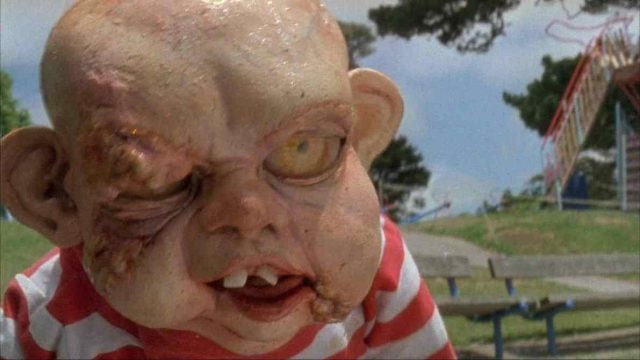Bad Taste wasn’t just the name of Peter Jackson’s 1987 debut feature, it was the thesis statement for his early career. From that movie, where aliens invade Earth with the aim of turning humanity into the next fast food item, to the Muppets-but-with-sex-and-violence antics of Meet the Feebles, to the zombie splatter comedy Braindead (known as Dead Alive in the US), Jackson’s first three movies established him as a low-budget master of sick jokes and gross-out humor, a sort of Kiwi Sam Raimi. Of these movies, Braindead stands as his most accomplished feature, even as it pointed the way towards a bigger future for him.
Braindead distinguishes itself early and often from other zombie films before and since. The start of its zombie outbreak isn’t anything supernatural or viral; rather, it begins from a bite from a vicious “Sumatran rat monkey.” The zombies in Braindead can think, solve problems, and form emotional attachments and vendettas. And while zombieness spreads through bites, as in most zombie movies, one notorious scene establishes that they can also breed. But perhaps Jackson’s single greatest master stroke is making every part of his zombies autonomous; that is, if a zombie’s digestive tract falls out, that just means the stomach can attack you.
Coming up with their own zombie lore shows Jackson and his co-writers, Fran Walsh and Stephen Sinclair’s supreme confidence, and true to form, they think through the implications of that lore in order to find ways to make it funny. If it’s established zombies can have sex and procreate, then the next step is for hapless hero Lionel (Timothy Balme) to take that zombie baby to the park and attempt at a normal family outing that ends with him punching and stomping on the baby as other horrified parents look on. By making each part of the zombies independently alive, Jackson sets the stage for a fabulously gory climax featuring Lionel, a lawnmower, and hundreds of liters of blood.
There’s a Looney Tunes quality to the movie that extends beyond the writing. In one of the comic high points, Father McGruder (Stuart Devenie) yells, “I kick arse for the Lord!” before beating up a group of zombie greasers with the most over-the-top slapstick possible. Jackson highlights this and other scenes of zombie mayhem in neon colors that feel far removed from the movie’s 1950s Wellington setting and finds the most extreme angles to shoot them from. It’s a borderline miracle that the emotional underpinning of Lionel trying to break out from under his tyrannical overbearing mother (Elizabeth Moody) while she slowly turns into a zombie, registers at all. In fact, Braindead may be Jackson’s first movie to hit emotional beats successfully — the characters in Bad Taste are barely distinguishable from one another, and the puppets of Meet the Feebles keep us at a remove.
Of course, the best joke of Braindead wouldn’t become apparent until almost a decade later, when Jackson became the auteur behind the Oscar- and box office-dominating success of The Lord of the Rings. Like Raimi, he changed the industry in ways that his gory early work never hinted at, without having to sell his soul in the process (the parallels don’t end there — Raimi followed the Spider-Man trilogy with Drag Me to Hell, a script he’d been working on since the ’90s, while Jackson made King Kong, which takes place on the same Skull Island as Braindead’s prologue). I wouldn’t trade The Lord of the Rings for anything, but there’s part of me that will always miss the guy who made a trio of low-budget splatter comedies in New Zealand in the late ’80s and early ’90s.

